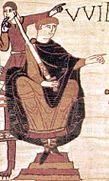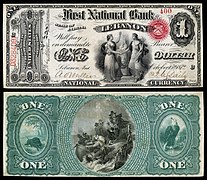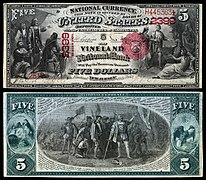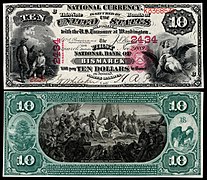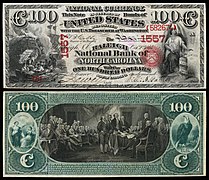Wikipedia:Main Page history/2022 September 28
From today's featured article
The Truce of Calais was agreed by King Edward III of England and King Philip VI of France (depicted) on 28 September 1347. After ten years of war both countries were financially and militarily exhausted and Pope Clement VI brokered a truce, to run until 7 July 1348. The Black Death caused the truce to be renewed in 1348, 1349 and 1350. The truce effectively restricted fighting, but did not stop repeated naval clashes nor much fighting on a smaller scale. In 1351 the truce was renewed for one year but in January 1352 full-scale fighting broke out again. On 6 April 1354 a new truce and an outline of a permanent peace treaty were agreed as the Treaty of Guînes. However, King John II of France then decided on an ambitious series of offensives for the 1355 campaigning season and repudiated the treaty. Yet another extension to the Truce of Calais was agreed, until 24 June, when it finally expired. The war resumed in force in October 1355. (This article is part of a featured topic: Hundred Years' War, 1345–1347.)
Did you know ...
- ... that in 1937, water from Tulainyo Lake (pictured) was carried by runner, horseback, donkey, covered wagon, twenty-mule team, stagecoach, train, car, and plane to Death Valley to mark a highway opening?
- ... that The Last of Us Part I features three accessibility presets for those requiring hearing, motor, or visual aids?
- ... that Earle M. Chiles, a businessman and philanthropist from Portland, Oregon, was also a senator of the board of Ludwig Maximilian University in Munich, Germany?
- ... that China Miéville's novella This Census-Taker fluctuates between the first and third person to convey the trauma felt by the protagonist?
- ... that the development of the Port of Tanjung Api-Api resulted in a bribery scandal implicating the incumbent governor?
- ... that Open Philanthropy has made grants to causes ranging from recession prevention to cancer vaccines for dogs?
- ... that Ukrainian baritone Danylo Matviienko, who holds a master's degree in mathematics, appeared as Demetrius in Britten's opera A Midsummer Night's Dream at the Oper Frankfurt?
- ... that Univel was an early-1990s attempt to compete with Microsoft on the desktop, but one industry consultant said of the company's goal, "they're dreaming"?
In the news
- The centre-right coalition wins a majority of seats in the Italian general election (Brothers of Italy leader Giorgia Meloni pictured).
- Kenyan Eliud Kipchoge sets a new world record at the Berlin Marathon.
- In Australian rules football, the AFL season concludes with Geelong defeating the Sydney Swans in the Grand Final.
- Following the death of Mahsa Amini, arrested for not wearing the hijab in accordance with government standards, at least 50 people are killed during protests in Iran.
On this day
- 1066 – William the Conqueror (pictured) and his fleet of around 600 ships landed at Pevensey, Sussex, beginning the Norman conquest of England.
- 1924 – A team of U.S. Army Air Service aviators landed in Seattle, Washington, to complete the first aerial circumnavigation of the world.
- 1963 – Whaam!, now considered one of Roy Lichtenstein's most important works, debuted at an exhibition held at the Leo Castelli Gallery, New York City.
- 2006 – Typhoon Xangsane passed Manila on its way to causing more than 300 deaths, mostly in the Phillippines and Vietnam.
- 2012 – War in Somalia: Somali National Army forces and their AMISOM and Raskamboni allies launched an offensive against Al-Shabaab in the latter's last major stronghold of Kismayo.
- Avery Brundage (b. 1887)
- Louis Pasteur (d. 1895)
- Aleksandra Goryachkina (b. 1998)
Today's featured picture
National Bank Notes were United States banknotes issued by national banks chartered by the U.S. federal government. The banknotes were usually backed by bonds deposited by the bank with the United States Treasury. In addition, banks were required to maintain a redemption fund amounting to five percent of any outstanding note balance, in gold or "lawful money". The banknotes were not legal tender in general, but were satisfactory for nearly all payments to and by the federal government. They were retired as a currency type by the federal government in the 1930s, when United States currency was consolidated into Federal Reserve Notes, United States Notes, and silver certificates. These nine banknotes, in denominations from $1 to $1000, were issued by various banks across the country as part of either the original or the 1875 series of National Bank Notes. Banknote design credit: Office of the Comptroller of the Currency and the Bureau of Engraving and Printing; scanned by Andrew Shiva
Recently featured:
|
Other areas of Wikipedia
- Community portal – The central hub for editors, with resources, links, tasks, and announcements.
- Village pump – Forum for discussions about Wikipedia itself, including policies and technical issues.
- Site news – Sources of news about Wikipedia and the broader Wikimedia movement.
- Teahouse – Ask basic questions about using or editing Wikipedia.
- Help desk – Ask questions about using or editing Wikipedia.
- Reference desk – Ask research questions about encyclopedic topics.
- Content portals – A unique way to navigate the encyclopedia.
Wikipedia's sister projects
Wikipedia is written by volunteer editors and hosted by the Wikimedia Foundation, a non-profit organization that also hosts a range of other volunteer projects:
-
Commons
Free media repository -
MediaWiki
Wiki software development -
Meta-Wiki
Wikimedia project coordination -
Wikibooks
Free textbooks and manuals -
Wikidata
Free knowledge base -
Wikinews
Free-content news -
Wikiquote
Collection of quotations -
Wikisource
Free-content library -
Wikispecies
Directory of species -
Wikiversity
Free learning tools -
Wikivoyage
Free travel guide -
Wiktionary
Dictionary and thesaurus
Wikipedia languages
This Wikipedia is written in English. Many other Wikipedias are available; some of the largest are listed below.
-
1,000,000+ articles
-
250,000+ articles
-
50,000+ articles




